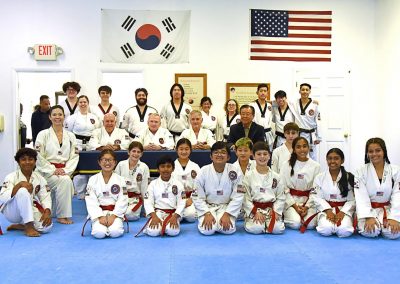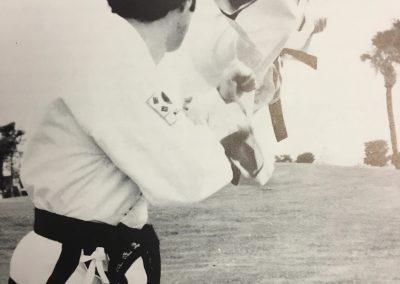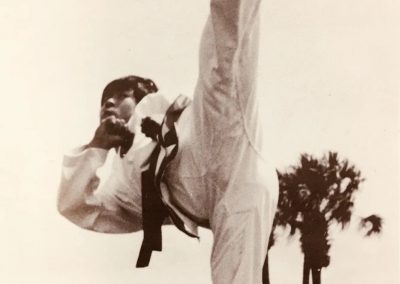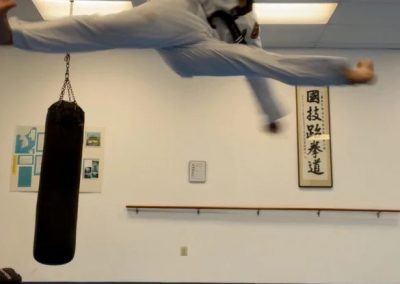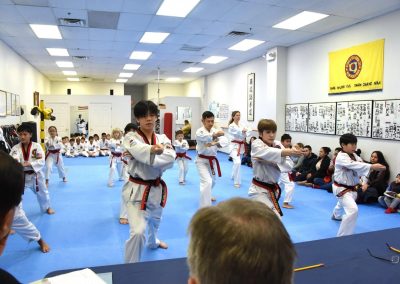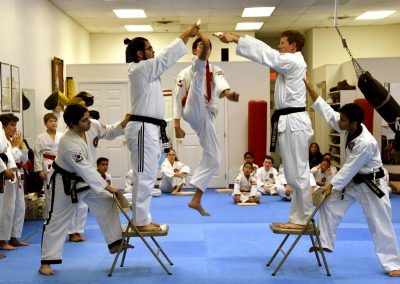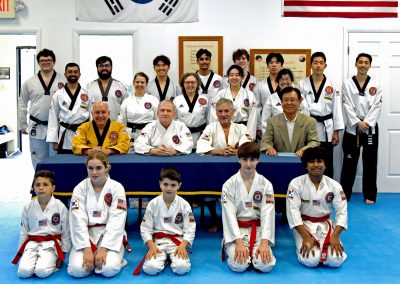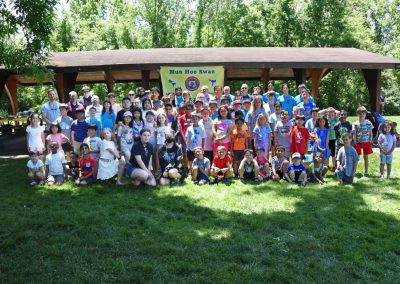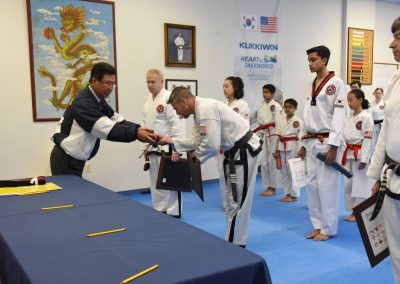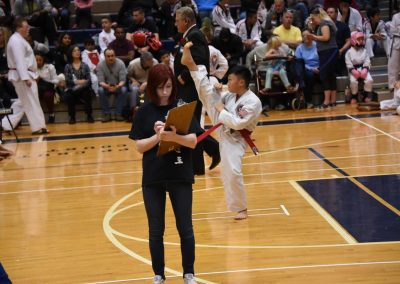News & Events
Benefits of Learning Tae Kwon Do
The Five Tenets of Taekwondo offer valuable lessons that benefit both body and mind. Embracing these tenets can lead to personal growth, improved relationships, and a more balanced, empowered life.
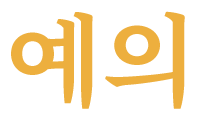
Courtesy
Teaches respect for others and encourages a positive social environment.
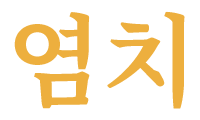
Integrity
Helps develop an honest and moral approach to life, fostering trust and self-respect.

Perseverance
Builds resilience, pushing you to overcome challenges and never give up on your goals.
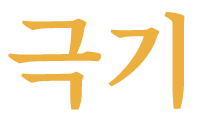
Self Control
Strengthens focus and emotional regulation, which is essential for managing stress and making sound decisions.

Indomitable Spirit
Instills inner strength, encouraging a mindset that can face adversity with courage and confidence.
What is Mun Moo Kwan?
Mun Moo Kwan (MMK), meaning “Gymnasium of Pen and Sword” in Korean, was founded by Grand Master Yun Hun Shin and served as the official Taekwondo school at Suwon Air Force Base in Korea during the 1960s. In 1969, Grand Master Byung Yul Kwak opened Kwak’s Taekwondo/Karate and, as a representative of Grand Master Shin, brought Mun Moo Kwan to the United States.
Our Philosophy
Our Taekwondo philosophy is centered on helping students grow into better individuals in every aspect of life. Traditional Taekwondo achieves this by training the mind, body, and spirit as a unified whole. Since the mind governs the body, martial artists must first learn to master their minds to reach their full potential. As the saying goes, “He who conquers himself is the greatest warrior.”
Our Goals
Our main goal is to help students become “champions in life” as well as martial arts champions. To achieve this, we emphasize the importance of respect for everyone and everything. For over two thousand years, Taekwondo has instilled respect for oneself and others, a core principle essential to developing the discipline and character of a true Taekwondoist.

Instructors
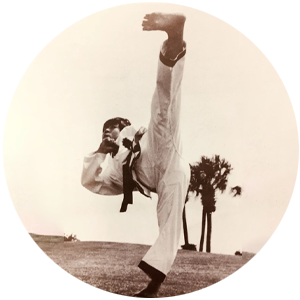
Byung Yul Kwak
Grandmaster
Grandmaster Byung Yul Kwak began taekwondo at age 9, a sport that profoundly shaped his life, and in 1962, he joined the South Korean Air Force. While there, he became a U.S. Air Force taekwondo instructor after American reservists requested training from his base commander. Over two years, he taught U.S. troops, which ultimately led to his opportunity to move to America. One of his students provided him with an affidavit, allowing him to come to the U.S. as a taekwondo instructor. Grandmaster Kwak arrived in the U.S. in November of 1970, at age 27, and immediately began teaching. In August 1973, he opened his own studio in Blue Bell, where he continues to teach today.
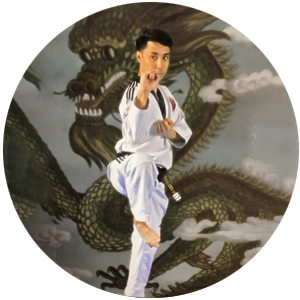
Peter Choi
Head Instructor
Peter Choi became a Tae Kwon Do head instructor under Grandmaster Byung Yul Kwak after years of focused training and dedication. Drawn to the martial art for its discipline, physical challenge, and philosophy, Mr. Choi committed himself to learning under Grandmaster Kwak, a master with decades of experience. Over the years, he honed his skills and deepened his understanding of the art’s core values. Grandmaster Kwak, recognizing Mr. Choi’s passion and potential, guided him through the ranks. After earning his black belt, Mr. Choi was entrusted with the role of head instructor, carrying forward Kwak’s teachings and philosophy to new students.

Our Affiliates
Kwak’s Taekwondo / Karate is affiliated with the “World Taekwondo (WT)”, located in Seoul Korea, and all of our black belts are certified by the WT.
Interested in Learning More About Kwak’s Tae Kwon Do?
Please call us at (610) 277-7771 or fill out the form below and ask about our free introductory class.
Frequently Asked Questions
What will I learn at Mun Moo Kwan?
The Korean martial arts of Taekwondo and Hapkido are both taught in the traditional manner at the school.
The methods of instruction are designed to help the student develop good character, integrity, self-defense and respect for others.
Apart from the physical benefits of this training, an often overlooked side effect is the psychological boost experienced by practitioners of these arts. The tremendous power generated imparts a feeling of well-being and self-confidence; constant and sometimes boring repetition of exercises teaches patience, preciseness and tenacity; and sparring teaches humility and courage. Eventually, this training permeates every conscious and subconscious action of the student – this noble art is a strict self-imposed discipline which creates the strength of character necessary for success in all walks of life.
What is Taekwondo?
Taekwondo literally translated means “The way or art of foot and fist.” It is an unarmed self-defense system incorporating principally the use of leg and kicking techniques as well as the hands. Taekwondo is defensive rather than offensive in spirit. The essence of Taekwondo training is of mind over body. It seeks for something deeper than simply acquiring physical strength and ability. It strives to make a better person through confidence, self-control, modesty, patience, humility and self-restraint. These are some of the guiding principles of this honorable and ancient art.
What is Hapkido?
Hapkido literally translated means “way or art of coordinated power.” This art is almost exclusively for self-defense. Hapkido emphasizes a non-violent code of counter-defense based on understanding the biological kinetics and vital points of the human body. The assailant’s aggression is redirected back towards himself using a minimum of your own force.
Who can study and what age?
Taekwondo and Hapkido can be studied by men, women and children of all ages. There are no age boundaries to the mental and physical benefits which can be realized from this training.
What is a Trial/Introductory Class?
What is the Kukkiwon/WT?
The Kukkiwon is the World Taekwondo (WT) Headquarters. It is the Kukkiwon that researches conducts Instructor seminars, and serves as the conduit for Dan/Poom promotion and certification. The Kukkiwon decides what the requirements for promotion are, and if things such as promoting interpretation are involved, then the Kukkiwon has the final say. When one is promoted to Dan/Poom rank, one receives a Kukkiwon certificate, not one from the WT. There was a period during the mid-1980s when Dan certificates were issued by the WT, with the WT logo at the top. However, that practice was discontinued by 1988.
The World Taekwondo on the other hand serves as the International Federation (IF) for purposes of the International Olympic Committee. As the IF for Taekwondo, the WT regulates all aspects of sports competition for Taekwondo. It is the WT that hosts the World Taekwondo Championships, and all other world events. It is the WT that certifies the people who serve as International Referees and conducts International Referee training. It is the WT who institutes the changes, if any, to the competition rules.
How old must a child be?
The ages 4 through 12 are the most formative in a child’s life. Their basic personality, temperament and value systems are established during these crucial years. Therefore, we strongly recommend that boys and girls in this age group begin this valuable training.
Will training improve my physical fitness?
In addition to being a fighting art and a sport, Taekwondo is a highly developed physical science. It develops coordination between mind and body.
In Taekwondo every part of the body is used. A person learns many ways to kick, block, punch, bend and move. In this way, all muscles are toned while one practices.
Health (weight control, body building) – no one was born with a strong body and soul. Like a moving machine needs proper lubrication in order to keep its life, one should know how to keep his health with physical cultivation. Health is always a first. A side benefit of Taekwondo training is the loss of excess weight.
How fast can I learn?
You start learning Taekwondo and self-defense techniques in your first lessons.
Since Taekwondo is a continuous program, there is no set time for a student to begin except when he or she is ready. Persons entering the program are given individual attention by the Instructor and by the more advanced students. Students are taught and advanced according to their own skill and initiative.
It is up to the individual as to how hard he or she wishes to train or to the rapidity of advancement.
What about self-defense?
Self-defense has become more important in recent years. Every person has the power and ability to fight in self-defense but few truly understand how to use it. People think of themselves as weak because they do not know how to use their strength. The goal of Taekwondo is to make the individual aware of his natural strengths and how to apply them to greatest advantage. The many powerful and graceful movements in Taekwondo will enable a person to defend himself by using any part of his body but mostly his brain. Therefore, a person will develop self-confidence because of the power and ability that has been mastered. This self-confidence can be carried over to all aspects of life.
Since this is a method of self-defense, the practitioner will make no attack unless threatened by an opponent. Taekwondo’s philosophy of self-control, self-restraint, kindness and humility are the cornerstones of our art.
Testimonials
“I’ve been training at Kwak’s since I was a kid. 10+ years later, and I’m still here! Great sense of community with fantastic instructors who put their heart and soul into teaching authentic taekwondo. I not only found this school fun and enjoyable as a child, but also gained a lot discipline and motivation to build a stronger character. Highly recommend for all ages!”
“My son has been attending this place for about a year and a half. I drive about 35 minutes for his lessons, and in the end, it’s worth it. After attending a few sessions here, you notice so many kids from different backgrounds. Many families have been part of this school for years, and what keeps them grounded is the community it fosters.”

